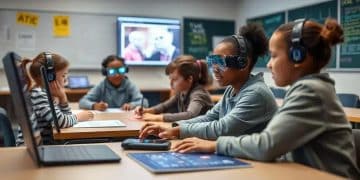EdTech investment trends transforming the education landscape

EdTech investment trends indicate significant growth driven by innovations in AI, personalized learning, and the increasing adoption of hybrid educational models, enhancing the learning experience and accessibility for students worldwide.
EdTech investment trends are changing how we approach education today. With technology advancing rapidly, have you considered how these trends could impact learners and educators alike? Let’s delve into the dynamics shaping this landscape.
Current state of EdTech investments
The current state of EdTech investments is vibrant and rapidly evolving. With many investors seeing potential in educational technologies, funding has surged over recent years. This trend highlights how crucial technology has become in delivering effective educational solutions.
Investment Landscape
Various segments within EdTech are attracting different types of investments. For instance, platforms focusing on online learning, administrative tools, and assessment technologies are gaining traction. Investors are eager to back solutions that demonstrate scalability and efficacy, which ultimately benefit learners and educators.
- Increased demand for online learning platforms.
- Growth of AI-driven educational tools.
- Rise of gamification in EdTech solutions.
Moreover, there’s a noticeable interest in startups that are innovating in personalized learning experiences. These methods aim to adapt education to individual student needs, making learning more effective and engaging. As more schools and institutions adopt these technologies, the investment focus shifts towards solutions that integrate seamlessly into current educational frameworks.
Key Areas of Growth
Investors are particularly interested in several key areas:
- Artificial intelligence applications for adaptive learning.
- Data analytics to assess student performance.
- Learning management systems.
These areas not only promise growth but also enhance the overall educational experience. Educational institutions increasingly rely on these technologies to improve outcomes and streamline operations.
Additionally, collaborations have been rising between educational institutions and tech companies. These partnerships pave the way for innovative programs that keep education relevant and accessible. With technology advancing so rapidly, the potential for further investment within the EdTech sector seems limitless.
Key players in the EdTech market

Understanding the key players in the EdTech market provides insight into the trends and innovations that shape education today. These influential companies lead the charge in developing technologies that make learning engaging and accessible for students worldwide.
Leading Companies
Some of the most prominent companies include:
- Coursera: Known for its extensive online courses from top universities, Coursera offers a platform for learners to gain skills at their own pace.
- Khan Academy: This nonprofit organization provides free educational resources and has revolutionized the way students learn with its interactive lessons.
- Duolingo: A player in language learning, Duolingo gamifies education, making learning a new language fun and challenging.
These companies have successfully attracted substantial investments, showcasing the growing demand for online education solutions. They aim to improve user experiences and incorporate advanced technologies like artificial intelligence and analytics.
Innovative Startups
In addition to established corporations, many innovative startups are also making waves in the EdTech sector. For example:
- Edmodo: A communication platform designed to connect teachers, students, and parents seamlessly.
- Quizlet: This platform supports students with study tools and flashcards, enhancing their revision experience.
- Nearpod: Designed for interactive lessons, Nearpod allows teachers to create engaging content for their classrooms.
Startups are often more agile and can quickly adapt to emerging trends and technologies. Their fresh perspectives drive competition within the market and promote continual improvement.
As these key players continue to develop and refine products, the importance of partnerships between EdTech firms and educational institutions cannot be overstated. Collaborations lead to tailored solutions that address specific needs, ultimately enhancing educational outcomes.
Emerging technologies in education
Emerging technologies in education are rapidly transforming how students learn and engage with content. These innovations play a crucial role in creating effective and interactive learning environments that foster individual growth and collaboration.
Artificial Intelligence
Artificial Intelligence (AI) is becoming a game-changer in education. It can personalize learning experiences based on students’ individual needs. For example, AI can analyze data to identify a student’s strengths and weaknesses, tailoring resources accordingly. This leads to:
- Enhanced learning paths that adapt over time.
- Instant feedback on assignments and quizzes.
- Interactive tutoring systems available 24/7.
These capabilities not only improve academic performance but also increase engagement among learners.
Virtual and Augmented Reality
Virtual Reality (VR) and Augmented Reality (AR) are revolutionizing classroom experiences. These technologies immerse students in interactive environments that make learning exciting. For instance, students can:
- Explore ancient civilizations through VR.
- Conduct science experiments in a simulated environment.
- Visualize complex math problems with AR overlays.
This kind of experiential learning increases retention and understanding, making education more memorable.
Additionally, blockchain technology is emerging as a means to verify credentials and track educational progress. This technology ensures that academic records are secure and easily accessible, providing a trustworthy way to validate accomplishments.
As these technologies continue to advance, they will play a critical role in shaping the future of education. Educational institutions are increasingly investing in innovative tools that enhance the learning experience and adapt to the changing needs of students.
Future predictions for EdTech growth

The future predictions for EdTech growth suggest a continuous upward trajectory, fueled by technological innovation and increased demand for flexible learning options. As education evolves, several trends are expected to shape the landscape significantly.
Increased Investment
Investment in EdTech is projected to rise as more stakeholders recognize its potential. With more funding comes greater opportunity for developing innovative solutions tailored to modern educational needs.
- Expansion of mobile learning platforms.
- Growth in personalized learning solutions.
- Integration of gamification in learning processes.
Investors are particularly eager to support technologies that demonstrate effective student engagement and outcomes.
Widespread Adoption of AI
The integration of artificial intelligence in educational technologies is anticipated to revolutionize learning experiences. AI can help provide tailored educational paths for students based on their performance and preferences. This future holds:
- Real-time analytics to monitor student progress.
- Enhanced tutoring systems adapting to each learner.
- Automated administrative tasks for educators.
These advancements will streamline the educational process and enable educators to focus more on teaching.
Another notable trend is the shift toward hybrid learning environments. More educational institutions will blend traditional teaching with digital resources. This flexibility is especially beneficial in today’s world, where adaptability is vital in face of challenges such as public health crises.
Finally, the global demand for online learning platforms is likely to drive further growth. As remote learning becomes accepted and even preferred by many, the market for quality online educational resources will expand significantly. The possibilities for future innovations in EdTech are vast, offering exciting opportunities for both learners and educators alike.
In conclusion, the future of EdTech looks promising with numerous trends poised to enhance learning experiences. As investment in educational technologies continues to rise, innovations such as AI and VR are set to play vital roles. The shift toward personalized and hybrid learning environments will allow students to engage in education that meets their needs. Moreover, emerging startups and established companies will drive this evolution, ensuring that education stays relevant in our fast-paced technological world. Embracing these changes will offer exciting opportunities for educators and learners alike, paving the way for a more dynamic and effective educational landscape.
FAQ – Frequently Asked Questions about EdTech Growth
What are the key trends driving EdTech growth?
Key trends include increased investment in educational technologies, the integration of artificial intelligence for personalized learning, and a shift towards hybrid learning environments.
How will AI impact the future of education?
AI will enhance educational experiences by providing customized learning paths, offering real-time feedback, and streamlining administrative tasks for educators.
What role do startups play in EdTech innovation?
Startups are essential for driving innovation in EdTech by developing unique solutions that address the evolving needs of educators and learners.
Why is hybrid learning becoming popular?
Hybrid learning combines traditional teaching with digital resources, offering flexibility and accessibility, which is especially important in today’s educational landscape.





